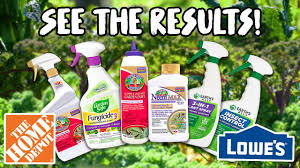The Best Insecticide for Your Vegetable Garden
Keeping your vegetable garden free from harmful insects is essential to ensure a bountiful harvest. Choosing the right insecticide can help protect your plants while maintaining a healthy environment. Here are some of the best insecticides for your vegetable garden:
Neem Oil:
Neem oil is a natural insecticide derived from the neem tree. It is effective against a wide range of pests, including aphids, mites, and caterpillars. Neem oil works by disrupting the feeding and reproduction of insects without harming beneficial insects.
Pyrethrin:
Pyrethrin is a botanical insecticide derived from chrysanthemum flowers. It is highly effective against many common garden pests, such as beetles, aphids, and caterpillars. Pyrethrin acts quickly to paralyze and kill insects on contact.
Spinosad:
Spinosad is a natural insecticide produced by soil bacteria. It is safe for use on vegetables and targets pests like thrips, caterpillars, and leafminers. Spinosad works by disrupting the nervous system of insects, leading to their death.
Diatomaceous Earth:
Diatomaceous earth is a powdery substance made from fossilized algae. It acts as a physical barrier to insects by absorbing their protective waxy layer, causing dehydration and death. Diatomaceous earth is effective against crawling insects like ants, slugs, and beetles.
When using insecticides in your vegetable garden, always read and follow the instructions on the product label carefully. Consider using organic or natural insecticides to minimize harm to beneficial insects and pollinators.
Top 6 FAQs About Choosing and Using Insecticides for Your Vegetable Garden
- When to apply insecticide to vegetable garden?
- What is safe to put on vegetable garden for bugs?
- Is Sevin safe for vegetables?
- What pesticide is safe for vegetables?
- What is the best pesticide for vegetable plants?
- What can I put on my vegetable plants to keep bugs from eating them?
When to apply insecticide to vegetable garden?
Knowing when to apply insecticide to your vegetable garden is crucial for effective pest control. It is recommended to apply insecticide in the early morning or late evening when beneficial insects are less active and bees are not foraging. Regular monitoring of your plants for signs of pest infestation can help determine the right timing for insecticide application. As a general rule, it is best to apply insecticide at the first sign of pest damage or when pests reach a threshold where they can cause significant harm to your plants. Always follow the instructions on the insecticide label regarding application frequency and timing to achieve optimal results while minimizing impact on beneficial insects and the environment.
What is safe to put on vegetable garden for bugs?
When considering what is safe to put on a vegetable garden for bugs, it is important to prioritize natural and organic insecticides that are gentle on plants and beneficial insects. Options such as neem oil, pyrethrin, spinosad, and diatomaceous earth are popular choices for controlling pests in a vegetable garden without causing harm to the environment or compromising food safety. These insecticides target a variety of common garden pests while minimizing potential risks to beneficial insects and pollinators. Always follow the instructions on the product label and consider integrated pest management strategies to maintain a healthy balance in your garden ecosystem.
Is Sevin safe for vegetables?
When considering the use of Sevin as an insecticide in your vegetable garden, it is important to understand its safety and potential impact. Sevin, which contains the active ingredient carbaryl, is a broad-spectrum insecticide effective against a wide range of pests. While Sevin is labeled for use on certain vegetables, it is crucial to follow the instructions carefully to minimize risks. It is recommended to avoid direct contact with the product and apply it when pollinators are not active to prevent harm to beneficial insects. Additionally, consider alternative organic or natural insecticides that may be safer for both your vegetables and the environment. Always prioritize the health and well-being of your plants, yourself, and the ecosystem when choosing an insecticide for your vegetable garden.
What pesticide is safe for vegetables?
When it comes to choosing a pesticide that is safe for vegetables, many gardeners opt for organic and natural options to protect their crops without harmful chemicals. Organic pesticides such as neem oil, pyrethrin, spinosad, and diatomaceous earth are popular choices for vegetable gardens as they are derived from natural sources and pose minimal risk to human health and the environment. These pesticides target common garden pests while preserving the integrity of the plants and the ecosystem. It is important to always read and follow the instructions on pesticide labels to ensure safe and effective application in your vegetable garden.
What is the best pesticide for vegetable plants?
When it comes to choosing the best pesticide for your vegetable plants, it is important to consider the specific pests you are dealing with and the overall health of your garden ecosystem. Many gardeners opt for natural or organic options like neem oil, pyrethrin, spinosad, or diatomaceous earth to protect their vegetable plants from common pests while minimizing harm to beneficial insects and pollinators. These pesticides work effectively against a variety of insects without leaving harmful residues on your produce. Always remember to follow the instructions on the product labels and use pesticides responsibly to maintain a healthy balance in your vegetable garden.
What can I put on my vegetable plants to keep bugs from eating them?
To protect your vegetable plants from being eaten by bugs, consider using natural insecticides such as neem oil, pyrethrin, spinosad, or diatomaceous earth. These options are effective in controlling a variety of pests while being safe for your plants and the environment. Neem oil disrupts insect feeding and reproduction, pyrethrin paralyzes and kills insects on contact, spinosad targets specific pests by disrupting their nervous systems, and diatomaceous earth acts as a physical barrier to crawling insects. Always follow the instructions on the product label when applying insecticides to ensure proper use and effectiveness in safeguarding your vegetable garden.

